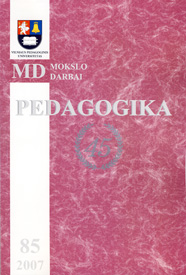Rašytinės kalbos, mąstymo, brandumo mokyklai ikimokykliniame amžiuje sąsajos
The Connection Between Written Language, Thinking and Maturity For School at the Preschool Age
Author(s): Bronislava Grigaitė, Giedrė LeonaitėSubject(s): Education
Published by: Vytauto Didžiojo Universitetas
Summary/Abstract: The prior analysis showed, that early assimilation of written language makes positive influence to child's perception, thinking and better preparation for school. Therefore, the experimental part of this work studies intelligences of preschool children. The purpose of this work is to show the influence of early learning of written language to the development of child's thinking and maturity for school. Further tasks were settled: 1) to study children intellectual peculiarities at the age of seven years, 2) to determine the influence of written language to children intelligence, 3) to determine children maturity for school level. 34 children of age 6—7 years (age average 6,9 years) attending two different kindergartens in Kaunas, were participating in this research. There were formed experimental and control groups. In the experimental group 16 children were taught written language after B. Grigaite formed programme. In the control group (without written language teaching) 18 children were researched. The analysis of research data showed that intelligence of experimental group and control group doesn't differ notably as well as the written language assimilation at the age of six — seven doesn't influence the extinction of Piaget phenomenon. Though, there was noticed a tendency, that according to RSPM tęst and Goodenough—Harry drawing tests, intelligence of those children who were learning written language was higher comparing to children, who were not taught to written language especially. As well as the mean of correct answers of Piaget exercises was higher for children who were learning written language comparing to children, who were not taught to written language. The research results show, that the assimilation of the written language at the child's age of six - seven influences child's maturity for school (p < 0,05). The maturity for school ratings of children who were developed according to written language program were well, very well and remarkably, whereas the dominate ratings in the control group were low.
Journal: Pedagogika
- Issue Year: 2007
- Issue No: 85
- Page Range: 161-165
- Page Count: 5
- Language: Lithuanian

